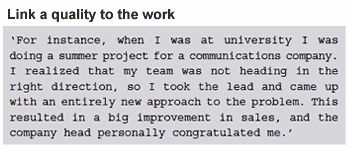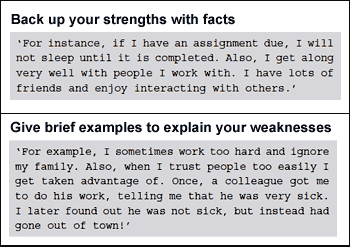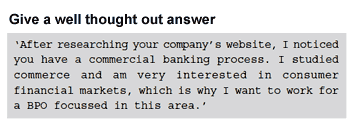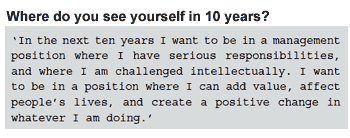
Good communication skills play a huge role in the recruitment process and job applicants who have weak skills are decidedly at a disadvantage. But what exactly are communication skills and how can you perfect yours well enough to get you your dream job?
Nasha Fitter, a teacher, entrepreneur and expert on communications and soft-skilled training, recently launched You're Hired! a book that helps job seekers improve their English communication and job placement skills.
Rediff.com will present a series of excerpts from the book over the coming weeks, and also feature chats with Nasha discussing the topics and intricacies of the job application process.
Here we present the eighth part of the series: I got an interview! Now what?
In this chapter, we will learn what to do once you actually get to the interview. We will go over basic questions that people are asked across a range of industries. Additionally, we will cover a few BPO-specific questions.
1. Dress well and look good.
2. Shake hands confidently.
3. Take an extra copy of your CV with you.
4. Do your homework and be prepared: no matter how confident you are, no one can ever be fully prepared for an interview. Go over your answers to possible questions. Have hard facts to talk about. Ask a friend or family member to do a mock interview with you. If that is not possible, try saying your answers out loud while looking at a mirror.
5. Look confident even if you don't feel it. There are two ways to reduce nervousness before interviews. One, prepare well so you are confident before you go in there. Two, realize that not getting a particular job is not the end of the world. If you can do this, you will begin to enjoy your interviews. The more you look forward to going to an interview, the better you will perform.
6. Learn from your interviews: Look at each interview as an opportunity to learn. It is no big deal if you are not selected for
a few jobs, instead analyse what went wrong in each failed interview. If you don't get a certain job, call the person who
interviewed you. Ask them if they have any suggestions for you so that you can improve before your next interview. You can learn a lot from your interviewer. Observe how they dress, how they talk, and really try to learn what you can. Interviews are great opportunities to gain knowledge on how professional environments operate. The more interviews you go to, the better you will become at answering interview questions.
Excerpted from You're Hired! (Rs 199) by Nasha Fitter with the permission of publishers Penguin Books.
In this continuing series, we will be featuring excerpts from You're Hired! covering topics such as pronunciation, speech, accent, email, interpersonal communication and professional etiquette. Get useful interview tips at Nasha's blog: http://nashafitter.rediffiland.com. So if you need help with your job search and career, watch this space!

Let's go over some common interview questions and how you can best answer them.
Can you tell us about yourself?
This is a very, very important question. Although it seems easy and straightforward, most people mess up the interview at this very question. This question gives you the opportunity to quickly differentiate yourself from the other candidates. No interviewer wants to hear you list your academic or other qualifications. But at the same time it is important that you talk about yourself in relation to the things mentioned in your resume. How do you do this? Here is a trick that usually works. Say something interesting about yourself:
'I am an assertive and ambitious person.' Then, link this quality to a work or academic experience. Make sure the example is a quick one: [In the pic alongside]
As you can see, you have accomplished two things. One, you have given the interviewer an insight into your personality. Two, you have talked about something on your resum but in a way that your interviewer will remember.
It is very important that you make sure the example you give is quick and to the point. Don't go on narrating a long story about yourself. You need to have crisp, concise examples prepared before walking into an interview.
If you can't think of an example for a certain quality, you need to pick another quality. No interviewer will remember what you said unless you give them an example. Hard evidence will make you stand out from other people.
This process can be tiring. It is difficult to introspect and come up with actual examples. It is very easy to say, 'I am a giving person.'
But it is when you have to think of actual experiences to back up this statement that things can get difficult. However, introspecting and learning about yourself is an important part of this process. Sit down and seriously analyse your past actions, your accomplishments, or the skills that you have developed.
Excerpted from You're Hired! (Rs 199) by Nasha Fitter with the permission of publishers Penguin Books.
In this continuing series, we will be featuring excerpts from You're Hired! covering topics such as pronunciation, speech, accent, email, interpersonal communication and professional etiquette. Get useful interview tips at Nasha's blog: http://nashafitter.rediffiland.com. So if you need help with your job search and career, watch this space!

This is another question that looks easy, but can actually be quite tricky. The key is to make your strengths and weaknesses link together and make your weaknesses really sound like strengths. For instance, let's say you tell your interviewer that your strengths are that you are hardworking and friendly.
First, you must give a quick one-sentence example to back up these strengths with facts. [In the pic alongside]
Next, you have to state your weaknesses. Your weaknesses should relate to these strengths. In this case then, you could say, 'I am a workaholic and I am easily trusting.'
Notice how being a workaholic is the flip side to being hardworking, and trusting people easily can be a side effect of being friendly. So, while you have listed attributes that are in fact weaknesses, they do not actually make you look bad! Instead, they make your strengths sound even stronger.
Next, you must give brief examples to explain your weaknesses:[In the pic alongside]
It is very important that when you state your strengths and weaknesses, you give actual examples to justify them. That will make it clear to your interviewer that you are not exaggerating, and that you have really thought deeply in order to come to these conclusions.
Excerpted from You're Hired! (Rs 199) by Nasha Fitter with the permission of publishers Penguin Books.
In this continuing series, we will be featuring excerpts from You're Hired! covering topics such as pronunciation, speech, accent, email, interpersonal communication and professional etiquette. Get useful interview tips at Nasha's blog: http://nashafitter.rediffiland.com. So if you need help with your job search and career, watch this space!

This is another question that you should not take lightly. First, you should research the company you are interviewing with. You can find information by going to the company website, by looking up press releases or news articles on the internet, by looking up annual reports, or by researching trade sites like NASSCOM or CII. You will be amazed at how much you can find on the internet on any given company (public or private). A simple online search with the company's name, or the name of the company's CEO can result in all kinds of useful information. You can also ask around to see if you know anyone who works for the company.
Second, you should know background information about the job you are interviewing for. You should know what the job entails, and be able to talk about why you will be good at it. You should bring up why you will be a good fit for the position during the interview, and be able to give a well-thought out answer like: [In the pic alongside]
HR managers are concerned with attrition and want to make sure you will not 'jump ship' if lured by extra money. If you are honest about the reasons you want to work in the company, it will be evident that you won't be tempted to leave quickly.
Excerpted from You're Hired! (Rs 199) by Nasha Fitter with the permission of publishers Penguin Books.
In this continuing series, we will be featuring excerpts from You're Hired! covering topics such as pronunciation, speech, accent, email, interpersonal communication and professional etiquette. Get useful interview tips at Nasha's blog: http://nashafitter.rediffiland.com. So if you need help with your job search and career, watch this space!

It is always best to be positive about the place where you work, even if you are unhappy there. Explain what you have learned in your current job, how you have grown (stick to the positives), and then talk about why you are looking for a change. It is perfectly okay to want to change jobs or careers. You only need to think of positive reasons for doing this. Some examples are wanting to learn more, wanting to grow intellectually, looking to take on greater responsibilities, etc.
Do not start talking about issues you have with your boss or colleagues. No one likes people who complain.
Where do you see yourself in 5/10/15 years?
The interviewer is asking you to really think and visualize your future goals. Stick to talking about your professional goals. It is important that you have some sort of goal to talk about, so that you don't seem unmotivated. At the same time, you don't want to come across as overly ambitious as it may sound fake and egoistic. Also, it may make some companies refrain from hiring you as they might think you will leave if lured by a better offer.
The best response is to talk about how you want to grow as a person, and what value you want to add to the world. A good example of how to answer this question is: [In the pic alongside]
Excerpted from You're Hired! (Rs 199) by Nasha Fitter with the permission of publishers Penguin Books.
In this continuing series, we will be featuring excerpts from You're Hired! covering topics such as pronunciation, speech, accent, email, interpersonal communication and professional etiquette. Get useful interview tips at Nasha's blog: http://nashafitter.rediffiland.com. So if you need help with your job search and career, watch this space!